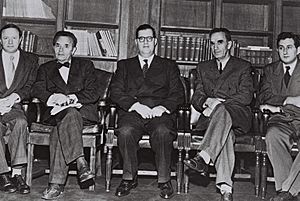Abba Eban facts for kids
Quick facts for kids
Abba Eban
|
|
|---|---|
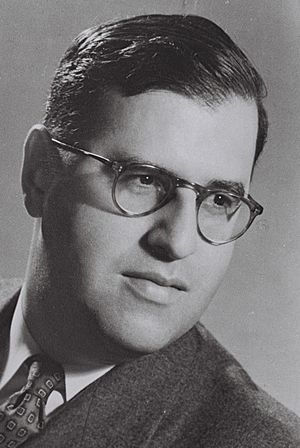 |
|
| Ministerial roles | |
| 1959–1960 | Minister without Portfolio |
| 1960–1963 | Minister of Education & Culture |
| 1963–1966 | Deputy Prime Minister |
| 1966–1974 | Minister of Foreign Affairs |
| Faction represented in the Knesset | |
| 1959–1965 | Mapai |
| 1965–1968 | Alignment |
| 1968–1969 | Labor Party |
| 1969–1988 | Alignment |
| Diplomatic roles | |
| 1949–1959 | Permanent Representative to the UN |
| 1950–1959 | Ambassador to the United States |
| Personal details | |
| Born | 2 February 1915 Cape Town, Cape Province, South Africa |
| Died | 17 November 2002 (aged 87) Tel Aviv, Israel |
| Alma mater | Queens' College, Cambridge |
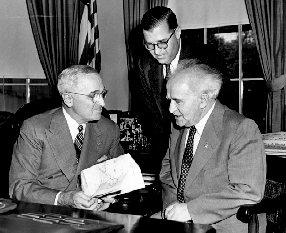
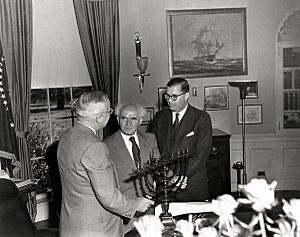
Abba Solomon Meir Eban (born Aubrey Solomon Meir Eban; February 2, 1915 – November 17, 2002) was an important Israeli diplomat and politician. He was born in Cape Town, South Africa. He was also a smart scholar who knew many languages, including Arabic and Hebrew.
During his career, he held many important jobs. He was the Foreign Affairs Minister, Education Minister, and Deputy Prime Minister of Israel. He was also Israel's second ambassador to the United States. He was the first person to represent Israel permanently at the United Nations.
Contents
Early Life and Education
Abba Eban was born in Cape Town, South Africa, on February 2, 1915. His parents were Lithuanian Jewish. His father passed away when Abba was very young. His mother later moved to the United Kingdom.
As a child, he spent weekends studying the Hebrew language, Talmud, and Biblical stories. He even lived in Belfast for a while. He went to St Olave's Grammar School and then to Queens' College, Cambridge University. There, he studied Classics and languages like Hebrew, Arabic, and Persian. He was very good at languages and reportedly mastered ten of them.
At just 23, he became a Fellow at Pembroke College. This meant he was a respected member of the university. He was expected to have a great career in academics.
World War II Service
When World War II began, Eban worked for Chaim Weizmann at the World Zionist Organization in London. He then joined the British Army. He became an intelligence officer in Jerusalem. He helped train volunteers to resist if Germany invaded. He also worked as a link between the Allies and the Jewish community in Palestine.
After the war, he helped set up a British Foreign Office center for Arab studies. At this time, he was known as "Aubrey Evans." In 1947, he translated an Arabic novel called Maze of Justice.
A Career in Diplomacy
Eban moved to New York to work for the Jewish Agency. This was when the United Nations was discussing the future of Palestine. In 1947, he helped the UN committee decide to divide Palestine into Jewish and Arab areas. This was called Resolution 181. Around this time, he changed his name to Abba, which means "Father" in Hebrew.
Eban continued to work at the United Nations for the next ten years. From 1950 to 1959, he was also Israel's ambassador to the United States. He was famous for being an amazing speaker. Henry Kissinger, a famous diplomat, once said that no one could match Eban's command of the English language. His speeches were so good they would "transfix" (fascinate) his listeners.
His deep knowledge of history and his ability to speak ten languages made his speeches even more powerful. He could speak well even to people who disagreed with him. In 1952, Eban was chosen as Vice President of the UN General Assembly. Many of his speeches were collected in a book called Voice of Israel. He was also known for his clever and witty remarks.
Political Life in Israel
In 1959, Eban left the United States and returned to Israel. He was elected to the Knesset, which is Israel's parliament. He was a member of the Mapai party. He served as Minister of Education and Culture from 1960 to 1963. Then, he became the deputy to Prime Minister Levi Eshkol until 1966. During this time, he also served as president of the Weizmann Institute of Science in Rehovot.
Foreign Minister
From 1966 to 1974, Eban was Israel's foreign minister. He defended Israel's actions after the Six-Day War. He told the United Nations that Israel acted because it faced a serious threat. He said that Israel had no choice when Egyptian forces moved against its territory.
Eban believed in trading parts of the lands taken in the war for peace. He played a key role in shaping UN Security Council Resolution 242 in 1967. He also helped with Resolution 338 in 1973. These resolutions were important steps towards peace in the Middle East. He even met with Pope Paul VI in 1969.
Sometimes, Eban was criticized for not speaking up enough in Israel's internal debates. However, he was generally seen as favoring peace. After leaving the government, he became more outspoken. In 1984, he chose to lead the Knesset's Foreign Affairs and Defense Committee.
He is often quoted for his remark about Arabs, saying they "never miss an opportunity to miss an opportunity" for peace. He said this after the Geneva peace talks in December 1973.
Later Life and Legacy
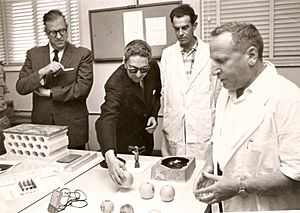
In 1988, after 30 years in the Knesset, he lost his seat. He then spent the rest of his life writing and teaching. He was a visiting professor at universities like Princeton University and Columbia University. He also narrated several TV documentaries. These included Heritage: Civilization and the Jews (1984) and Israel, A Nation Is Born (1992).
Abba Eban passed away in 2002 and was buried in Kfar Shmaryahu, near Tel Aviv. He was survived by his wife, Shoshana "Suzy" Eban, and their two children.
Family
Abba Eban's son, Eli Eban, is a talented clarinet player. He teaches at Indiana University. Eli has two children, Yael and Omri Eban.
Abba Eban's brother-in-law was Chaim Herzog, who became the sixth President of Israel. Chaim Herzog's son, Isaac Herzog, has been the President of Israel since 2021.
Eban's cousin, Oliver Sacks, was a famous neurologist and author. Eban's nephew, Jonathan Lynn, is a filmmaker and writer. He is known for the satirical BBC shows Yes Minister and Yes, Prime Minister. Jonathan Lynn said that one episode of Yes, Prime Minister was based on a story Abba Eban told him.
Awards
In 2001, Abba Eban received the Israel Prize. This is one of Israel's highest honors. He received it for his lifetime achievements and special contributions to society and the State of Israel.
See also
 In Spanish: Abba Eban para niños
In Spanish: Abba Eban para niños


